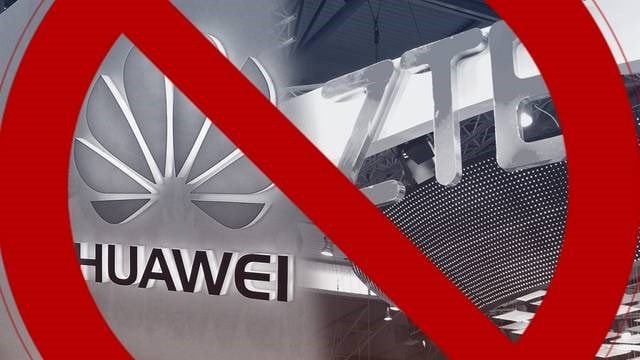Which European countries are banning 5G equipment from leading Chinese telecom equipment makers?
(Baonghean.vn) - Germany has become the latest European country to propose a ban on the use of 5G equipment made by China's Huawei and ZTE, citing national security concerns.
Although the US government has blacklisted two of China’s top telecom equipment makers, Huawei and ZTE, over national security concerns, it is not over yet. They continue to pressure European countries to take similar action against the Chinese tech giants.

Some European Union (EU) countries were initially hesitant on the issue, but they have since taken steps to block Huawei and ZTE from participating in their 5G infrastructure.
Notably, last June, Thierry Breton - the EU's industry chief called on all EU countries to block Huawei and ZTE from their 5G telecommunications networks.
Germany recently became the latest EU country to propose a ban on the use of Huawei and ZTE equipment. Like other countries, Germany cited security concerns as the main reason for its decision.
Below is a list of EU countries that have so far imposed restrictions or bans on the use of Huawei and ZTE equipment in telecommunications networks in general and 5G mobile networks in particular.
United Kingdom
In 2020, the UK government decided to ban Huawei and other suppliers it deemed to pose a high security risk to 5G networks. Accordingly, the government will provide £1.6 million to Japanese company NEC to support the project to develop 5G networks.
Although China's Huawei ban has made the UK's 5G rollout more time-consuming and costly, last year the UK extended the deadline to completely remove Huawei-made core network equipment until the end of 2023. The deadline to remove all Huawei equipment from the UK's 5G network by the end of 2027 remains unchanged.
Estonia
Estonia joins a group of EU countries banning Huawei and ZTE equipment from their telecom networks after the Estonian Parliament passed a new law in 2021 prohibiting domestic telecom operators from choosing Chinese telecom equipment suppliers.
Denmark
Denmark has also expressed concerns about Chinese telecom equipment suppliers participating in the development of its 5G network. In response to these concerns, Danish lawmakers decided in 2021 to pass a law that would allow foreign investments to be screened to ensure they do not pose a threat to national security.
France
The French government in 2020 told domestic telecom operators planning to buy Huawei 5G equipment that their licenses for the equipment would not be renewed when they expired and that they would need to come up with a plan to effectively remove all Huawei telecom equipment from their mobile networks. This immediately caused telecom companies in France to shun Huawei 5G equipment.
Virtue
Earlier this year, Germany planned to ban telecom operators from using some components made by Chinese companies such as Huawei and ZTE in their 5G networks. This is said to be a significant move to address security concerns in the country. The German government said that the ban would apply to components already integrated into German telecom networks. The government will require operators to remove and replace them.
On September 20, the German Interior Ministry proposed forcing telecom operators to remove all key components made by Huawei and ZTE from their 5G core networks by 2026.
IDEA
While Italy has not banned Huawei equipment outright, it has prevented telecoms group Fastweb from signing a deal for Huawei to supply equipment for the country's 5G network in 2020.
Latvia
Latvia and the United States formally signed an agreement in 2020 on security in 5G mobile networks. The agreement aims to restrict the activities of Chinese companies in Latvia, especially telecommunications equipment suppliers that pose national security concerns such as Huawei and ZTE.
Lithuania
In 2021, the Lithuanian Parliament issued a decree on the use of telecommunications equipment from foreign companies in 5G networks, according to which the country's Parliament only allows equipment approved by the government for national security reasons to be used in the country's next-generation 5G network.
Portugal
In May, the Portuguese government recommended banning domestic mobile operators from sourcing 5G equipment from suppliers based outside the EU or countries that are not members of the North Atlantic Treaty Organization (NATO) or the Organization for Economic Cooperation and Development (OECD).
The government believes that companies outside these jurisdictions pose a “high risk” to the country’s mobile network security. The document does not specifically name Huawei, but since China is not a member of NATO, OCED or the EU, the company, along with other Chinese suppliers such as ZTE, will be excluded from building Portugal’s 5G network.
In a move closer to excluding Huawei equipment from 5G networks, Portugal's telecoms watchdog said on September 18 that it is working with mobile operators to implement a high-level solution that will effectively block Huawei equipment from the country's 5G mobile networks.
The ban on Chinese telecoms equipment suppliers from participating in 5G networks is seen as a sudden turn for Portugal, a country that has had close relations with China for many years.
Romania
The Romanian government has passed a US-backed bill in 2021 that aims to ban Chinese telecommunications equipment suppliers such as Huawei and ZTE from participating in the construction of the country's 5G network infrastructure.
Sweden
In 2020, the Swedish Post and Telecommunications Authority (PTS) announced a ban on the use of Huawei and ZTE equipment in the development of the country's 5G network. The ban was announced before Sweden opened an auction to build the 5G network, with four companies allowed to participate, all of them Swedish.
The ban follows an assessment by Sweden’s security and military that China is one of the country’s biggest threats. In addition to the ban, PTS has also set a deadline of January 1, 2025, for 5G service providers to remove all Huawei and ZTE equipment.
Why does the US ban Huawei and put pressure on allied countries?
The US has banned Huawei from its 5G infrastructure and pressured its allies largely due to national security concerns. There are several key reasons for this ban, including:
1. Concerns about espionage:The US government is concerned that Huawei, as a Chinese company, could be coerced or coerced by the Chinese government to use its technology to conduct espionage or cyberattacks against the US, raising concerns about the security of critical infrastructure.
2. Network vulnerability:5G technology is considered more vulnerable to cyberattacks due to its increased complexity and potentially larger attack surface. Allowing Huawei to build key parts of 5G infrastructure could pose a national security risk.
3. Supply chain security:The US is concerned about the security of the global supply chain for telecommunications equipment. Huawei's dominance in the sector raises concerns about the integrity of the technology and the possibility of backdoors or vulnerabilities that can be exploited.
4. Trade and geopolitical tensions:The Huawei ban also comes amid growing trade and geopolitical tensions between the US and China, which have influenced the decision to restrict Huawei’s involvement in key infrastructure projects.
5. Allies' concerns:The US has encouraged its allies and partners to also exclude Huawei from their 5G networks, arguing that a united front is needed to protect against potential security risks. Due to these concerns, the US government has taken a number of actions, including banning the use of Huawei equipment in federal agencies and urging US telecommunications companies to avoid using Huawei technology. In addition, the US has pressured its allies to limit Huawei's participation in their 5G networks, resulting in varying degrees of restrictions in different countries.
So far, 11 European countries have decided to ditch Huawei and other Chinese companies in building their 5G networks. Other countries may join in the future but have not yet announced their intentions. All of these countries have cited national security concerns as the reason for banning Huawei 5G equipment.



.jpg)





